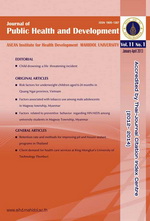Risk factors for underweight children aged 6-24 months in Quang Ngai province, Vietnam
Main Article Content
Abstract
A cross-sectional study was conducted to examine significant risk factors associated with underweight
status among children aged 6-24 months in Quang Ngai province, Vietnam. The study factors included
parental socio-demographic factors, maternal knowledge, food provision practices, and maternal and child
health care. Multistage stratified sampling was used to select 250 mothers who had children aged from 6 to
24 months. After the mothers consented to participate in this study, they were interviewed using a structured
questionnaire. Their children were measured for weight and height. The statistics used were the Chi-square
test and multiple logistic regression.
Nearly 31% of the children were underweight. The Chi-square test indicated the following factors
separately significantly influenced the likelihood of children being underweight: parental education, family
income, child birth weight, maternal knowledge (regarding food provision and child growth monitoring),
frequency of essential food provision, orange juice provision, separation of food for children, amount of food
eaten, the number of prenatal checkups, medical checkups before delivery, duration of day sleep, washing
mother’s hands before preparing food, drinking oral rehydration solution, and having latrines. When adjusted
for iodized salts and other factors, children who were fed protein inappropriately had a 2.18 times greater
risk of being underweight than those who were appropriately fed.
Appropriate feeding programs focusing on protein and iodized salt provision and raising maternal aware-ness of maternal and child health care should be implemented, especially for high-risk groups to reduce the
prevalence of underweight children.
status among children aged 6-24 months in Quang Ngai province, Vietnam. The study factors included
parental socio-demographic factors, maternal knowledge, food provision practices, and maternal and child
health care. Multistage stratified sampling was used to select 250 mothers who had children aged from 6 to
24 months. After the mothers consented to participate in this study, they were interviewed using a structured
questionnaire. Their children were measured for weight and height. The statistics used were the Chi-square
test and multiple logistic regression.
Nearly 31% of the children were underweight. The Chi-square test indicated the following factors
separately significantly influenced the likelihood of children being underweight: parental education, family
income, child birth weight, maternal knowledge (regarding food provision and child growth monitoring),
frequency of essential food provision, orange juice provision, separation of food for children, amount of food
eaten, the number of prenatal checkups, medical checkups before delivery, duration of day sleep, washing
mother’s hands before preparing food, drinking oral rehydration solution, and having latrines. When adjusted
for iodized salts and other factors, children who were fed protein inappropriately had a 2.18 times greater
risk of being underweight than those who were appropriately fed.
Appropriate feeding programs focusing on protein and iodized salt provision and raising maternal aware-ness of maternal and child health care should be implemented, especially for high-risk groups to reduce the
prevalence of underweight children.
Article Details
How to Cite
1.
โฮดัก เ, ชมพิกุล จช, เสริมศรี ส. Risk factors for underweight children aged 6-24 months in Quang Ngai province, Vietnam. J Public Hlth Dev [internet]. 2013 Apr. 1 [cited 2026 Feb. 25];11(1):3-18. available from: https://he01.tci-thaijo.org/index.php/AIHD-MU/article/view/7566
Section
Original Articles


